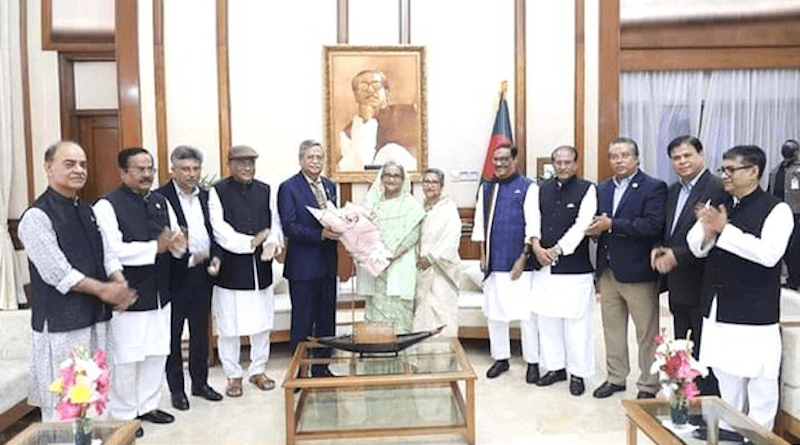Bangladesh: Presidential Pick Seen As Strategic Move Ahead Of Election
By BenarNews
By Kamran Reza Chowdhury
A Sheikh Hasina loyalist has been declared as Bangladesh’s next president as the country heads toward an election where the official is expected to play a more prominent role following the dissolution of parliament.
Bangladesh’s president, a largely ceremonial role, is usually elected by parliament, but that step was skipped because only one candidate was nominated for the post – by the ruling Awami League.
Md. Shahabuddin, 73, will become president in late April when the current president’s term ends. The appointment of the little-known, retired judicial officer was seen as a surprise, as he was not one of a dozen or so names widely discussed as likely picks for the post.
But one analyst sees him as a strategic pick ahead of elections expected in late December or early January 2024. Parliament is generally dissolved three months prior to election day.
None of the leaders whose names were discussed in the mainstream media and the social media “had complete docility” to Hasina, the prime minister, and her party, said Nizam Uddin Ahmed, a political commentator and a professor of public administration at Chittagong University.
“A big factor for picking a loyal person like Md. Shahabuddin is the probable impending political unrest over holding the next general elections under a non-party caretaker government as demanded by the opposition BNP,” he told BenarNews.
He was referring to the Bangladesh Nationalist Party and other opposition parties’ demand for a so-called neutral government in the lead-up to and during the election to ensure the polls are held fairly. The Hasina government has not given in to that demand.
“In such political chaos, the prime minister must need the support of the president. The president can facilitate political dialogue between parties,” Ahmed said.
“In our system, the president’s role is ceremonial. But [even] a minimal criticism by the president in the public domain would trouble her government.”
Ahmed recalled Hasina’s 1996-2001 tenure as PM when she appointed the non-partisan former Chief Justice Shahabuddin Ahmed (no relation to Md. Shahabuddin) as president. The former chief justice often openly criticized Hasina’s government, putting the prime minister in an uncomfortable position, Ahmed said.
“At one stage, the relations between the government and the president became bitter. She knows the trouble a ceremonial president can cause to the government,” Ahmed said.
He criticized the prime minister for picking the president without consulting lawmakers who would usually elect the president in the legislature.
“The Awami League parliamentary party met. But the party secretary did not allow any MP to talk about the presidential candidate. He told the meeting that all MPs have the trust of the prime minister to pick the presidential candidate and the MPs shouted yes,” Ahmed said.
“This is not a democratic procedure. I think the prime minister could have discussed the candidate’s name with the MPs.”
Criticism of World Bank
Ram Dulal Bhowmick, a long-time resident of Pabna, from where the presumptive president hails, spoke of Md. Shahabuddin’s loyalty to the ruling Awami League.
“After the assassination of Bangabandhu Sheikh Mujibur Rahman [on Aug. 15, 1975], he was jailed for three years for his allegiance to Awami League politics,” Bhowmick told BenarNews.
The 73-year-old had been jailed for opposing the government that formed after Hasina’s father, Mujib, was assassinated. Mujib led the movement which brought Bangladesh’s independence and served as its first head of government.
Bhowmick also spoke of Md. Shahabuddin’s criticism of the World Bank, with regard to a huge infrastructure project, the Padma Bridge.
“I think, one of the factors that earned him the nomination [as president] is his handling of the World Bank charge of corruption in the Padma Bridge project as a commissioner at the Anti-Corruption Commission,” Bhowmick said.
Md. Shahabuddin had rejected claims of widespread corruption that caused the World Bank to withdraw funding for the bridge project a decade ago.
Bangladesh built the $3.6 billion bridge anyway, and it was launched in mid-2022 with much fanfare, giving more than 30 million people in southwestern Bangladesh a way other than ferry to access the rest of the country.
But that success has been somewhat eclipsed by economic woes that have led the IMF to extend a $4.7 billion loan to keep the country afloat.

